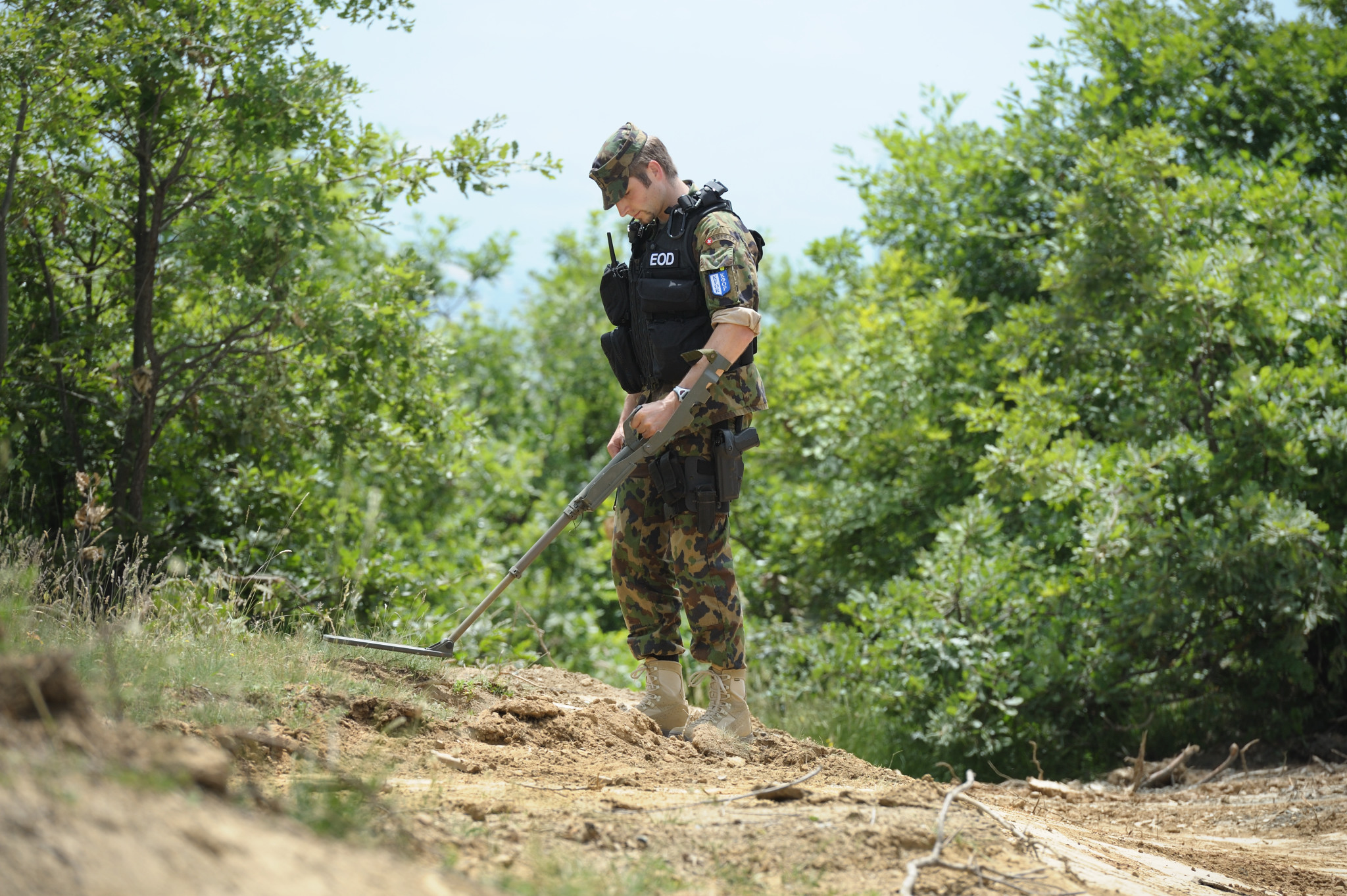
Concerns raised over Swiss troops in Kosovo

Switzerland’s largest ever peacekeeping operation, the Swisscoy mission in Kosovo, has been extended for another three years. But the mission is not without critics.
Swiss soldiers have been on the ground in Kosovo for 12 years and the new mandate approved by parliament on Monday includes the possibility of boosting the 220-strong contingent at short notice by 80 additional troops for 12 months.
The move has raised timeworn questions about Swiss neutrality, the justification for the mission and how best to deal with Kosovo, whose independence Switzerland recognised promptly in 2008.
Defence Minister Ueli Maurer said the presence of an international peacekeeping force was key for political stability in the region. His support for Swisscoy is at odds with the position of his party, the rightwing Swiss People’s Party.
In military terms, Switzerland has certainly gained by participating in the Nato-led K-for peacekeeping force. The engagement has enhanced the experience and visibility of the army.
But at an annual cost of SFr37.5 million ($45 million), is the mission worth it? Two of the five main political parties – the centre-left Greens and the Swiss People’s Party – think not, partly on the grounds that the deployment breaches Swiss neutrality.
“Swisscoy is a mission without end or result and it should be stopped on December 31. It has done nothing to slow Kosovan immigration,” Ulrich Schlüer of the People’s Party told the House of Representatives during Monday’s debate.
“Useless”
Other commentators argue that the mission has outlived its usefulness.
Military expert Albert Stahel from Zurich University told swissinfo.ch that the presence of Swiss troops in Kosovo was problematic because they had little to do with protecting the Serbian minority.
“At the beginning in 1999 it was of course useful for Nato to have troops in Kosovo because there was still a threat from Serbia, but since that situation has changed, the troops are now engaged in internal security problems and protecting the Serbian minority [in the north] in particular.”
Except that there is little or no Serbian population where the Swiss contingent is based in the south, Stahel points out. Some 140 soldiers are based in the Swiss camp, known as Casablanca, near Suva Reka.
So what are the Swiss army volunteers actually doing in Kosovo? They have a range of tasks, according to Walter Frik, spokesman for the Swiss Armed Forces International Command (Swissint), including two liaison teams on the ground near the Serb border in the north.
“The main idea is to help K-for ensure a safe environment for civilians and to fulfil the tasks received from K-for. These are mainly logistical tasks but there are also four LMTs [Liaison Monitoring Teams] who live in the community and act as an early warning system in detecting problems for K-for,” Frik explained.
Insecure
The situation in the north is volatile, according to Frik. “The main concern of K-for is that this area stays calm. You will not see much media coverage about it because it is hard to move around freely and report from there.”
Apart from instability, there is the added problem of organised crime high up in the Kosovan administration, Stahel said.
“The [recently leaked] Nato intelligence report spelt it out clearly that organised crime was deeply embedded in Kosovo. There is a strong link between people acting as criminals in Switzerland and leaders in Kosovo,” he said.
In this context, Stahel argues that Swisscoy’s presence in Kosovo is not in Switzerland’s interest. “Rather than protecting civilians they are supporting organised crime,” he said.
Providing a safe environment for ordinary people to go about their daily lives in Kosovo is in Switzerland’s interest, Frik insists. He points out that the 3,000-strong European Rule of Law mission (Eulex) works with the local authorities, judiciary and police and that crime comes under its domain.
“But when Eulex has problems moving around, it is K-for that protects their vehicles, clears roadblocks etc.,” he added.
Twelve years on, Frik is proud of the Swiss contribution to peace in Kosovo. “We can say that we also participated, we didn’t just send money and let the others do this job. Our guys are serving there voluntarily.”
Kosovo functioned as a UN protectorate from the end of the Kosovo war until 2008, when it formally declared independence from Serbia.
Swisscoy has been part of the multinational K-for troops in Kosovo since 1999. About 4,200 Swiss soldiers have participated in missions so far.
The troops are armed for self-defence but do not join peace enforcement operations.
A sizeable ethnic Albanian community from Kosovo has been living in Switzerland since the 1990s.
The Swiss Armed Forces have been involved in peace support missions since 1953. Currently a total of 273 men and women from the rank of first private to major general are involved in peace missions in 15 countries on three continents. The vast majority are militia personnel.
During and after the breakup of Yugoslavia, there were increasing ethnic and regional conflicts, culminating in the Kosovo war of 1998-9.
Skirmishes between the Kosovo Liberation Army and Yugoslav forces resulted in a massive displacement of the population in Kosovo.
In March 1999, Nato forces started to bomb Yugoslavia in an effort to drive Yugoslav forces out of Kosovo. President Slobodan Milosevic finally capitulated.
The UN Security Council passed resolution 1244, which placed Kosovo under transitional UN administration (Unmik) and authorised K-for, a Nato-led peacekeeping force.

In compliance with the JTI standards
More: SWI swissinfo.ch certified by the Journalism Trust Initiative































You can find an overview of ongoing debates with our journalists here . Please join us!
If you want to start a conversation about a topic raised in this article or want to report factual errors, email us at english@swissinfo.ch.